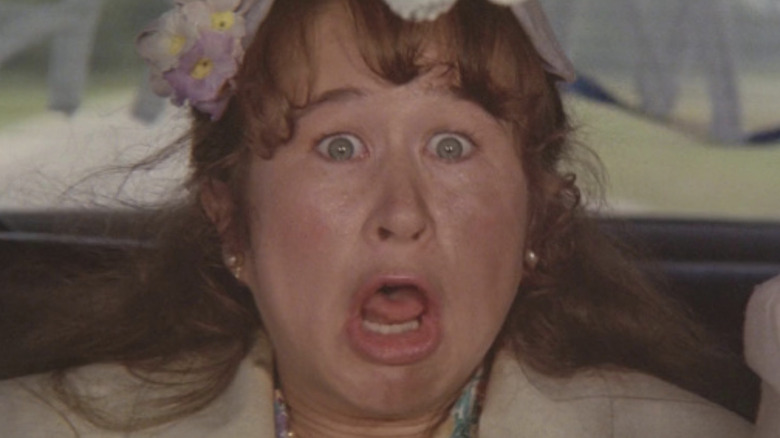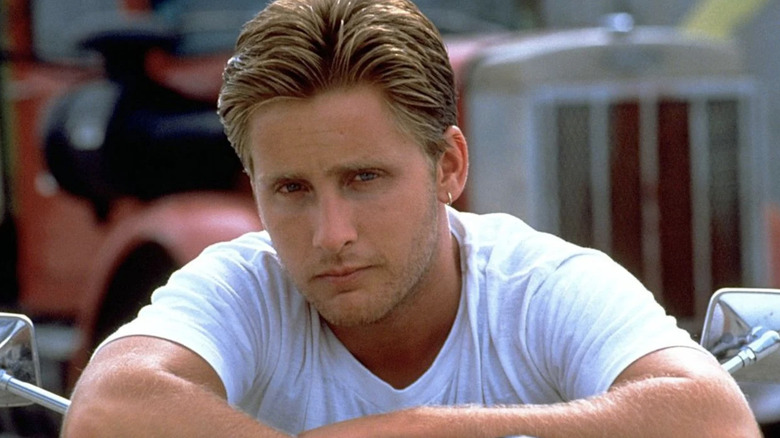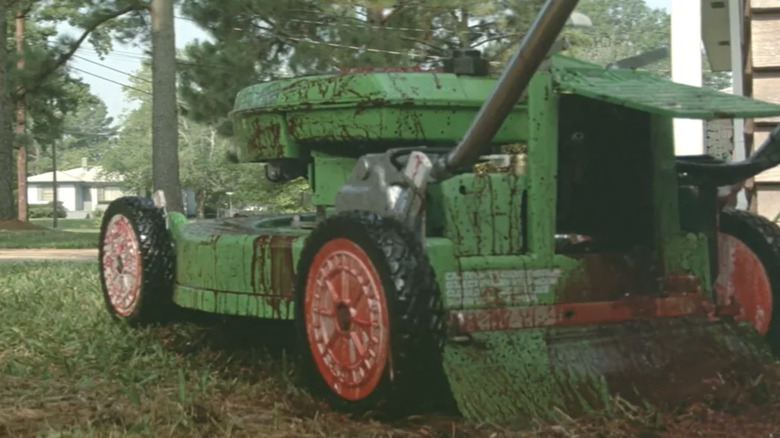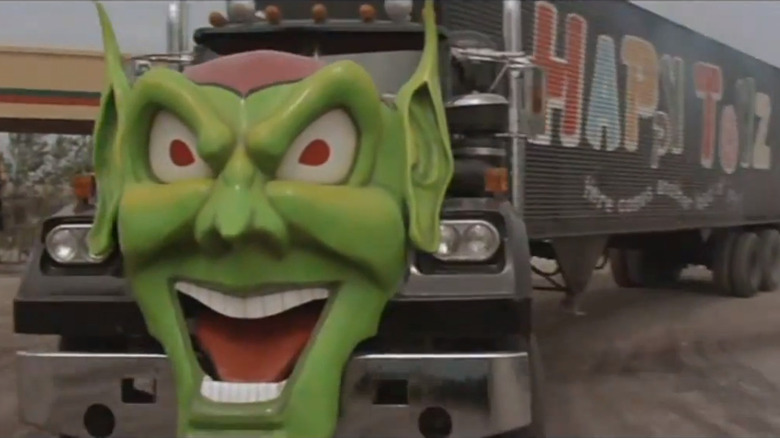Stephen King Has Repeatedly Apologized For His Most Bonkers Movie
It's undeniable that Stephen King has shaped the nightmares of generations across the globe with his truly terrifying works of fiction. King's works have been turned into over 60 films and television series, but the modern master of horror has but a single directorial venture to his name. Based on King's short story "Trucks," the Emilio Estevez-starring "Maximum Overdrive" is about a world caught in chaos after a radiation storm warps the machines on Earth, which gain a mind of their own and attack all of humanity. A group of survivors take refuge in a North Carolina truck stop diner, trying to survive the machines running amok, including a group of predatory semi-trucks circling the building.
Everything about "Maximum Overdrive" is out of control, from lawnmowers chasing down preteens on bicycles, soda machines firing cans into the foreheads of little league coaches like the Vending Mouth ability from "Kirby and the Forgotten Land," and an ATM that uses its digital screen to call King, in his director's cameo, an "a-hole." King is known for his ability to craft horrific worlds of monsters and mayhem, but thanks to some questionable cocaine-motivated decisions, a soundtrack of nothing but AC/DC, and an unimaginable level of camp humor, "Maximum Overdrive" is anything but scary. The film has plenty of defenders and has developed a cult following over the year, but based on how King talks about the movie, it's clearly not the final product he had been hoping to present to the world.
A regrettable venture by all
Stephen King has never shied away from discussing his history of substance abuse, most notably, a wicked cocaine addiction from 1978-1986. He famously has no recollection of penning his killer dog story, "Cujo," allegedly writing some of his stories from this time with cotton swabs up his nose. Unfortunately, King's direction on "Maximum Overdrive" was made under similar circumstances, with the writer admitting to having been "coked out of his mind" through the production. King has been sober for many years, and doesn't look back at his directorial experience with much fondness.
Star Emilio Estevez has said that "Maximum Overdrive" is the one movie he regrets doing, even acknowledging that King feels bad for even putting him in that position. As Estevez tells it, "The few times that I've connected with him over the years, he's like, 'Can you forgive me for that?'" Estevez's mother Janet Sheen also questioned his decision to take the role, with Estevez explaining that he wanted to work with Stephen King. "Couldn't you have helped him paint his house?" she asked.
The film began production in May of 1985 at the De Laurentiis studio in Wilmington, North Carolina. Camera assistant Silvia Giulietti claims that King loved to eat sardines every morning, which meant the director would be on set with cocaine fueled fish breath all day long. Producer Dino De Laurentiis had brought in a crew of mostly Italians and some from Mexico, which meant there was a language barrier between most of the crew.
'He didn't know where to put the cameras'
Giulietti says that despite King's brilliant mind, he wasn't much of a director. "He didn't know where to put the cameras," she said. "We arrived one month before to shoot the movie and [cinematographer] Armando Nannuzzi did not speak English, so it was very funny because Stephen King was always speaking for minutes and Armando Nannuzzi was always saying 'Yes, yes, yes' without understanding one word." Communication wasn't difficult solely because of the language barrier, but because King was not used to explaining himself like a director. "Stephen King had a very strong idea about the movie, but he was not able to translate it into images, you know what I mean?" she continued. "I do think writing and directing are very different talents, and it's hard enough to be good at one of them," said production assistant Chip Hackler.
Nannuzzi was also at the center of a real-life horror story that occurred on set, when a remote controlled lawn mower lost control and crashed into a block of wood used to support the camera. The lawnmower shredded the block, shooting splinters everywhere, and one found its way directly into Nannuzzi's right eye. The gifted cinematographer lost his eye, eventually suing King for $18 million in damages. The two eventually settled out of court, but this tragic incident is emblematic of the absolute nightmare of chaos that would become the final cut of "Maximum Overdrive."
Maximum Overdrive three decades later
"Maximum Overdrive" was obliterated by critics upon release, and many audience members still view the film as King's worst adaptation, but a rabid fanbase has grown over the years, reveling in the anti-King nature of his one and only attempt behind the director's chair. There's a definite ironic enjoyment to be found in "Maximum Overdrive," a film so silly that it seems impossible to have been directed by the same person who wrote "The Shining," "Carrie," and "IT." In the three decades since "Maximum Overdrive," King has gotten sober, but says there are many aspects of his past that he is "sorry that [he] regrets." One of those things is "Maximum Overdrive."
While King never directed again, he hasn't completely ruled out the possibility, hoping to give it another go with a clearer mind. Until then, we can still find ways to enjoy "Maximum Overdrive," the best movie ever made to feature a homicidal blow dryer and a semi-truck donning the face of the Green Goblin from "Spider-Man."



